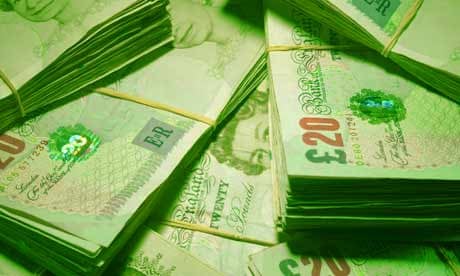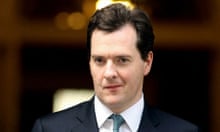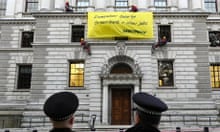The big day is here, so what should those who care about the environment be looking for in the comprehensive spending review? It is brought to you by the prime minister, who aspires to lead (as we never tire of reminding him) "the greenest government ever", and his chancellor, George Osborne, who also has form when it comes to making bold, green statements. "If I become chancellor, the Treasury will become a green ally, not a foe." And there's plenty more where that came from. But has the presence of the Lib Dems in the coalition tempted the Conservatives to push greenery down their own agenda?
Before getting to my checklist, it's worth casting an eye over the "Environment narrative" page that Danny Alexander was captured reading yesterday.It is analysed here by Juliette Jowit, and is far from encouraging for those hoping for big green wins in the CSR.
Here's the list, in my order of importance, with thanks to those who have already written on this for us, including ex-No 10 adviser Michael Jacobs, e3g director Tom Burke and Green Alliance director Matthew Spencer.
1. Green investment bank. (Responsible department: business)
Not looking at all good, despite being a manifesto commitment for both coalition parties and backed by a Tory-commissioned report. Greens want a real bank, with £6bn of capital which can be leveraged many times over to stimulate green investment, plus the ability to raise bonds – a key way to make financially attractive the high start-up but low running costs of renewable energy and energy efficiency projects. But it looks like the bank will be a label stuck on £2bn of existing funds, all brought together in one place, which will lack the ability to leverage against private capital. Such result would be a bitter disappointment and genuinely worrying, given the massive investment required and the difficulty of raising money in the current economic climate.
2. Carbon capture and storage (CCS) demonstration plants. (Department of Energy and Climate Change - Decc)
Better news here, but only in a a tiny-bit-full way. My colleagues reported this week that the energy and climate change secretary, Chris Huhne, had won £1bn of funding for CCS demonstration plants. These are the installations that will capture the carbon dioxide pumped out by fossil fuel power stations, transport it and bury it underground, where it can't drive global warming. No one has yet built one at industrial scale, so in the last days of the Labour administration and with cross-party support, the government was given the power to raise a levy from consumer energy bills to pay for four CCS demonstration plants and their upkeep over 15 years, costing about £9.6bn in total. So £1bn will pay to build one, leaving the other three in real trouble, given that no utility company wants to splurge on R&D in the openly competitive market.
The problems here are that, one, the levy counts as public spending thanks to Office of National Statistics rules and the government wants to reduce public spending; and, two, that energy consumers already fund several green schemes through their bills: CERT, Renewable Obligation and Feed-in tariffs (FITs). Without all four CCS demos getting funding, it's hard to see how the UK balances energy security with its climate change obligations in the 2020s, and impossible to see how the government's green industrial policy has real meaning.
3. Warm Front and the "green deal" (Decc)
Wait and see. Warm Front, which spent £280m a year on improving energy efficiency for poorer households, looks set to be axed, but we don't know how the promised "green deal" will compensate or how the UK's appalling rates of fuel poverty will be addressed.
4. Renewable heat incentive (RHI) (Decc)
A good win. It looks like there will be £400m for green heating schemes, important because the vast majority of household energy is used for space and water heating. RHI should deliver more emissions-reducing bang-per-buck than both the renewables obligation and feed-in tariffs for power generator, but there is a question over whether the rate of the incentive will be high enough to encourage decent take-up. Lastly, after 11 reports and consultations over eight years it is definitely about time something actually happened.
5. Agriculture-environment schemes (Department for the Environment, Food and Rural Affairs - Defra)
Wait and see. The government dishes out about £400m a year (with half coming from EU) on schemes that encourage land owners to improve the environmental quality of their acres. The entry level scheme (about £280m) is not highly regarded by greens, but the higher level scheme (£120m) is. Cuts in the latter will cause serious harm to the countryside and and the fauna and flora there.
6. Port infrastructure (Department for Transport - DfT)
A win. The £60m pledged by the last government to upgrade ports so they can handle offshore wind turbines appears to be safe, despite fears last week that it would be scrapped. Just as well, as the investment promised by overseas manufacturers in the UK's currently miniscule turbine industry was conditional on the ports upgrade.
7. Climate change diplomacy (Foreign and Commonwealth Office - FCO)
Wait and see. This little-known arm of the FCO has done some great work in promoting the UK's approach the tackling global warming. How the 100-strong diplomat corp fares may not be apparent tomorrow, as time is needed for the cuts to filter down from the top. Cuts would be damaging.
8. Feed-in tariffs for small scale renewables (Decc)
Not looking good. It seems very likely that the bonus paid to people in the future who install solar panels and other renewable technologies will be cut from the rates set by Labour. That will infuriate the industry which has invested in creating installation capacity and will dim the enthusiasm of homeowners. It also does exactly what the wider renewables industry hates the most - changes the rules after the game has started, smashing investor confidence.
9. Transport (DfT)
Not looking good. Analysts at the Campaign for Better Transport expect big cuts in roads, which might be good from a climate change perspective but for annual rail fare rises to go up from RPI+1% to RPI+3%, which by the magic of compound interest makes a predicted 37% rise over the five years of this government - hardly an encouragement to travel green. Previous stories suggest the government will back a subsidy of up to £5,000 for low-carbon vehicles, but limit it for now to about 8,000 vehicles, far less than the 46,000 suggested by Labour.






Comments (…)
Sign in or create your Guardian account to join the discussion